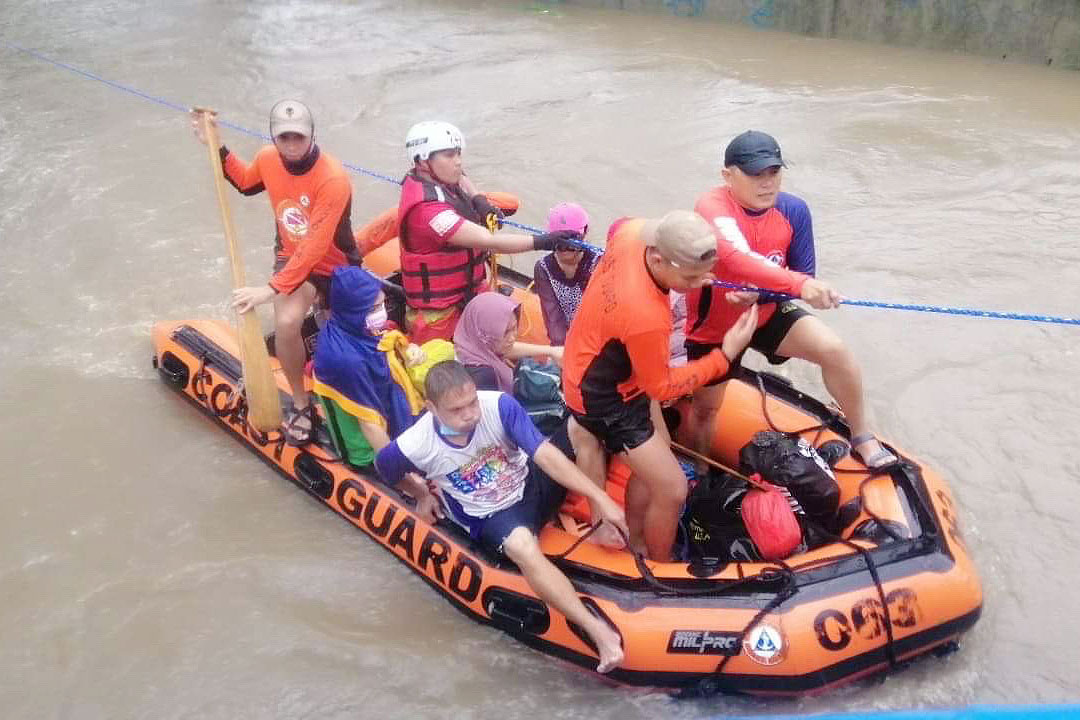
Typhoon survivors left vulnerable to COVID-19 – BusinessWorld Online

Damaged health facilities, inadequate medicine and medical equipment, and overstretched health workers are the main challenges in typhoon-affected communities, according to relief operations in Odette-devastated Visayas and Mindanao.
Frequently reported health issues include injuries, diarrhea, and upper respiratory tract infections, with the risk for communicable diseases like coronavirus disease 2019 (COVID-19) also increasing in cramped and poorly maintained evacuation centers.
The United Nations children’s agency UNICEF, which has humanitarian efforts geared toward affected children in Surigao del Norte, Siargao Island, Dinagat Island, Southern Leyte, Cebu, and Bohol, shared via e-mail that families are unable to practice physical distancing in crowded shelters and have no masks to keep them safe against the virus.
Power outages, too, are hampering health facilities, local governments, and responders such as healthcare practitioners and social workers from extending assistance.
With these conditions, the 631,000 displaced as of a week after the typhoon made landfall suffer not only from lack of food, potable water, shelter, electricity, and hygiene items, but are also at risk for COVID-19, especially given the recent Omicron surge.
“To address these multiple risks, we need to empower local communities and authorities to respond. Local health systems need to be supported to continue to prevent, detect and treat cases of COVID-19. Affected communities must be provided with adequate resources to practice public health standards,” UNICEF said.
These include clean water and soap for hand washing, masks, evacuation centers with adequate space for physical distancing, and the continuation of COVID-19 vaccination.
LESSONS FROM YOLANDA
For Typhoon Yolanda survivors living in resettlement sites in Tacloban City, the situation remains dire eight years after the disaster struck, with issues like lack of livelihood and vaccine hesitancy, according to researchers at Leyte Normal University (LNU).
“As they have been resettled and are isolated on the outskirts of Tacloban City, disaster-affected households are facing significant health, economic, and social challenges in the pandemic,” said Ara Joy U. Pacoma, a lecturer from LNU, at the Harvard Humanitarian Initiative’s symposium in November about COVID-19 in the margins.
Citing her study co-authored with fellow researchers Yvonne Su and Ginbert P. Cuaton in 2021, Ms. Pacoma shared that of the 352 households in resettlement sites they surveyed, 42% earned less since the pandemic and 19% lost jobs.
The resulting decrease in amount and quality of food, with many reporting reducing their meals to just two a day, puts them at risk for all sorts of illnesses.
Over 75,000 people live in Tacloban’s resettlement sites, built to house those displaced by Typhoon Yolanda in 2013. However, poor living conditions that include the lack of running water, electricity, and open spaces, along with insufficient livelihood opportunities and financial assistance, place these people at risk for COVID-19, she added.
VACCINE HESITANCY
The study also found that 95.8% of respondents in the Tacloban settlements were unvaccinated as of June, with 73.11% saying they had read fake news on social media.
Vaccine hesitancy, declared by the World Health Organization, the Philippine government, and various health and medical experts as a major challenge in this pandemic, remains strong in the peripheries of society, as seen in Tacloban.
“Top concerns of the participants included lack of trust in the vaccine, its possible side effects, and its unknown future effects,” said Ms. Su of the equity studies department at York University, in an online article in December. “These answers reveal low vaccine literacy and encounters with misinformation.”
A lack of government public health campaigns targeting the marginalized areas creates an opportunity for fake news about COVID-19 and the effectiveness of vaccines to become rampant, according to Ms. Pacoma.
To improve the quality of life of disaster survivors in resettlement, she suggested co-production of programs that will benefit them, done through inclusive and participatory community consultations. — Brontë H. Lacsamana
Stay connected with us on social media platform for instant update click here to join our Twitter, & Facebook
We are now on Telegram. Click here to join our channel (@TechiUpdate) and stay updated with the latest Technology headlines.
For all the latest Education News Click Here
For the latest news and updates, follow us on Google News.

